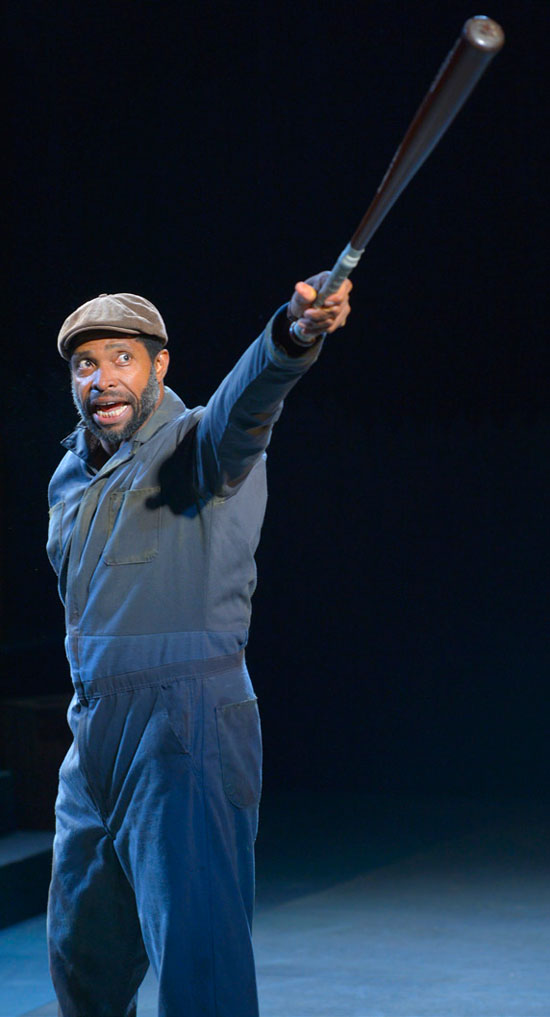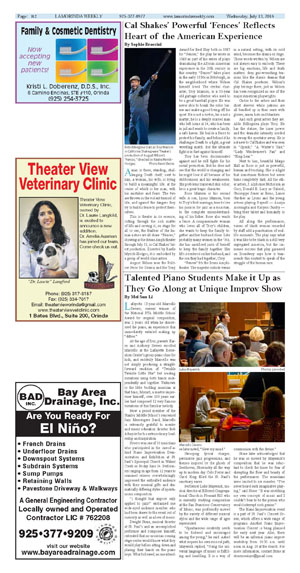| | Published July 13th, 2016
| Cal Shakes' Powerful 'Fences' Reflects Heart of the American Experience
| | | By Sophie Braccini |  | | Aldo Billingslea stars as Troy Maxson in California Shakespeare Theater's production of August Wilson's "Fences, " directed by Raelle Myrick-Hodges. Photo Kevin Berne |
A man is there, standing, challenging Death itself; next to him, a woman, his wife, is trying to build a meaningful life, at the center of which is her man, with his mistakes and fears. The two are thrown in the violent turmoil of life, and against the dangers they try to build a fence to protect themselves.
 This is theater in its essence, cutting through the rich matter of life and serving it, on stage for all to see, the frailties of the human nature we all share. "Fences," showing at the Bruns Amphitheater through July 31, is Cal Shakes' latest production. Directed by Raelle Myrick-Hodges, it is embodied by a group of world-class actors.
This is theater in its essence, cutting through the rich matter of life and serving it, on stage for all to see, the frailties of the human nature we all share. "Fences," showing at the Bruns Amphitheater through July 31, is Cal Shakes' latest production. Directed by Raelle Myrick-Hodges, it is embodied by a group of world-class actors.
 August Wilson won the Pulitzer Prize for Drama and the Tony Award for Best Play both in 1987 for "Fences," the play he wrote in 1983 as part of his series of plays dramatizing the African-American experience in the 20th century in this country. "Fences" takes place in the early 1950s in Pittsburgh, in the neighborhood where Wilson himself lived. The central character, Troy Maxson, is a 53-year old garbage collector who used to be a great baseball player. He was never able to break the color barrier and make a good living off his sport. He is not a victim, he is not a martyr;he is a deeply scarred man who left home at 14, who has been in jail and wants to create a family, a safe haven. He builds a fence to protect his family, and behind it he challenges Death to a fight, a great wrestling match. But the ultimate fight is in fact against himself.
August Wilson won the Pulitzer Prize for Drama and the Tony Award for Best Play both in 1987 for "Fences," the play he wrote in 1983 as part of his series of plays dramatizing the African-American experience in the 20th century in this country. "Fences" takes place in the early 1950s in Pittsburgh, in the neighborhood where Wilson himself lived. The central character, Troy Maxson, is a 53-year old garbage collector who used to be a great baseball player. He was never able to break the color barrier and make a good living off his sport. He is not a victim, he is not a martyr;he is a deeply scarred man who left home at 14, who has been in jail and wants to create a family, a safe haven. He builds a fence to protect his family, and behind it he challenges Death to a fight, a great wrestling match. But the ultimate fight is in fact against himself.
 Troy has been discriminated against and he still fights for his social promotion. But he does not see that the world is changing and he might lose it all because of his stubbornness and his weaknesses. His problems transcends skin color; he is a great tragic character.
Troy has been discriminated against and he still fights for his social promotion. But he does not see that the world is changing and he might lose it all because of his stubbornness and his weaknesses. His problems transcends skin color; he is a great tragic character.
 Rose Maxson is his second wife. A son, Lyons Maxson, born to Troy's first marriage, tries to live his passion for jazz as a musician, to the complete misunderstanding of his father. Rose also wants a fence. A compassionate woman who loves all of Troy's children, she wants to keep the family together and her husband close. Like probably many women in the '50s, she has sacrificed parts of herself to keep the family together. Her life is centered on her husband, and the son they had together, Cory.
Rose Maxson is his second wife. A son, Lyons Maxson, born to Troy's first marriage, tries to live his passion for jazz as a musician, to the complete misunderstanding of his father. Rose also wants a fence. A compassionate woman who loves all of Troy's children, she wants to keep the family together and her husband close. Like probably many women in the '50s, she has sacrificed parts of herself to keep the family together. Her life is centered on her husband, and the son they had together, Cory.
 "Fences" fits the Bruns Amphitheater. The majestic outside venue in a natural setting, with its cold wind, becomes the drama on stage. Those words written by Wilson are not always easy to embody. These are big emotions, life and death matters, deep gut-wrenching tensions like the classic dramas that Cal Shakes produces. Wilson's play belongs there, just as Wilson has been recognized as one of the major American playwrights.
"Fences" fits the Bruns Amphitheater. The majestic outside venue in a natural setting, with its cold wind, becomes the drama on stage. Those words written by Wilson are not always easy to embody. These are big emotions, life and death matters, deep gut-wrenching tensions like the classic dramas that Cal Shakes produces. Wilson's play belongs there, just as Wilson has been recognized as one of the major American playwrights.
 Cudos to the actors and their short sleeves while patrons are all bundled up in their seats with gloves, warm hats and blankets.
Cudos to the actors and their short sleeves while patrons are all bundled up in their seats with gloves, warm hats and blankets.
 And such great actors they are. Aldo Billingslea plays Troy. He has the stature, the inner power and the dramatic intensity needed to sweep the spectator away. He is not new to CalShakes and was seen in "Spunk," "A Winter's Tale," "Lady Windermere's Fan" and "King Lear."
And such great actors they are. Aldo Billingslea plays Troy. He has the stature, the inner power and the dramatic intensity needed to sweep the spectator away. He is not new to CalShakes and was seen in "Spunk," "A Winter's Tale," "Lady Windermere's Fan" and "King Lear."
 Next to him, beautiful Margo Hall as Rose is just as powerful, human and touching. She is a light that sometimes flickers but never turns completely dark. All the other actors, J. Alphonse Nicholson as Cory, Donald E. Lacy as Gabriel, Guisseppe Jones as Bono, Lance Gardner as Lyons and the young actress playing Raynell - Anaiya Asomugha and Kailynn Guidry - bring their talent and humanity to the play.
Next to him, beautiful Margo Hall as Rose is just as powerful, human and touching. She is a light that sometimes flickers but never turns completely dark. All the other actors, J. Alphonse Nicholson as Cory, Donald E. Lacy as Gabriel, Guisseppe Jones as Bono, Lance Gardner as Lyons and the young actress playing Raynell - Anaiya Asomugha and Kailynn Guidry - bring their talent and humanity to the play.
 All along the performance, voices of black women recorded by staff add a punctuation of real-life moments. The play says what it was like to be black in a still very segregated America, but the immense success that play garnered on Broadway says how it transcends this context to speak of the struggle of the human race.
All along the performance, voices of black women recorded by staff add a punctuation of real-life moments. The play says what it was like to be black in a still very segregated America, but the immense success that play garnered on Broadway says how it transcends this context to speak of the struggle of the human race.


|
| | | | | | | | | | | | |



